A few days ago, we attentively followed two different events with Ferran Adrià in Milan. The first was a dinner at Identità Golose Milano, the International Hub of Gastronomy in Via Romagnosi 3. Here the Catalan chef dined while four chefs representing Le Soste di Ulisse cooked, starting with president Pino Cuttaia, from La Madia in Licata (Agrigento), author of the dessert, and then, following the long menu, Gioacchino Gaglio of Gagini in Palermo, Angelo Treno of Al Fogher in Piazza Armerina (Enna), Damiano Ferraro of Capitolo Primo in Montallegro (Agrigento).
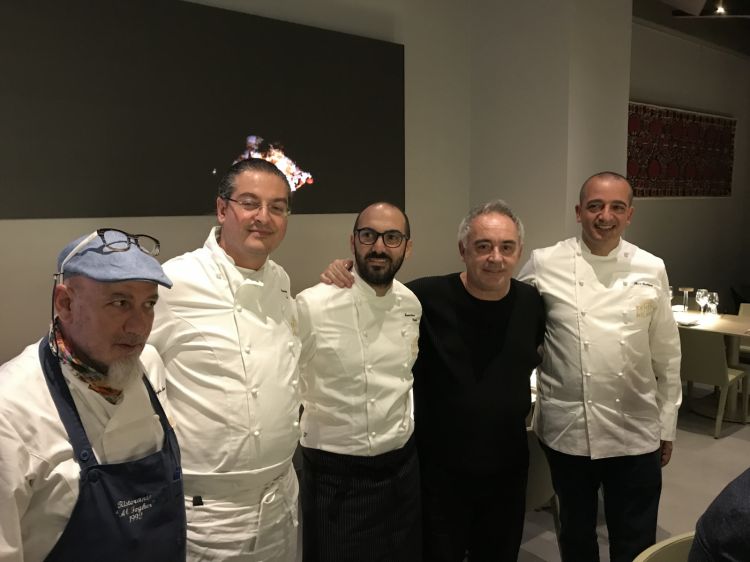
Ferran the other night with the four guest chefs representing Le Soste di Ulisse: Angelo Treno, Damiano Ferraro, Gioacchino Gaglio and Pino Cuttaia
The second moment was the following day, at the
Lavazza Flagship Store in Piazza San Fedele 6, again in Milan, for the presentation of
Coffee Sapiens,
Lavazza’s contribution to
Adrià’s great
Bullipedia project. We’ll cover this in detail in the next piece. For now, let’s start with
Adrià at
Identità Golose Milano.
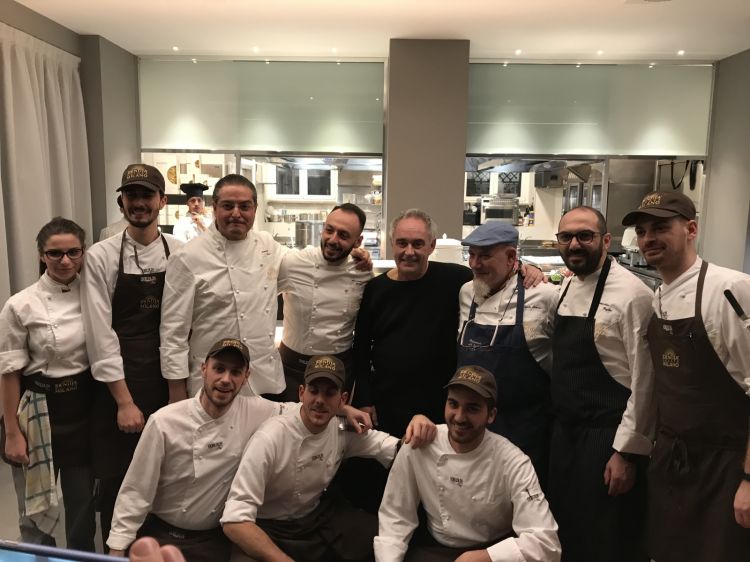
Adrià with the brigade at Identità Golose Milano (plus the Sicilian guests)
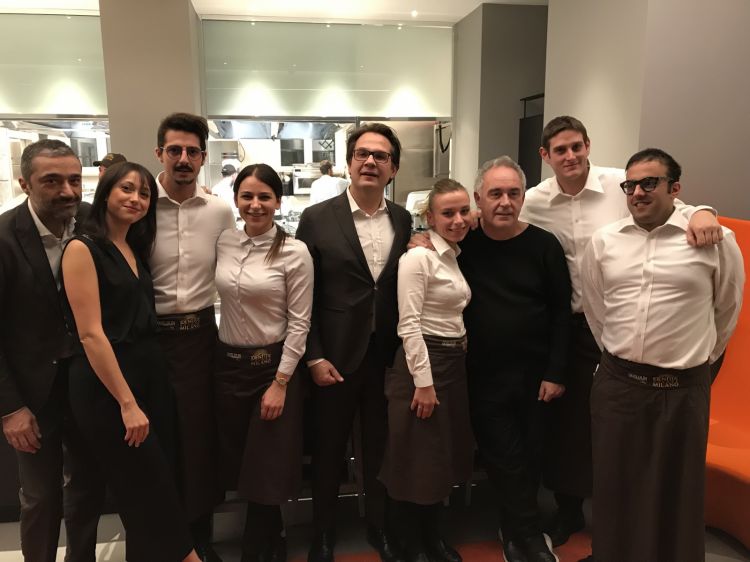
Adrià with the staff at Identità Golose Milano

Alessandro Rinaldi’s casatielli: the Catalan chef loved them
«
Felicitaciones, una calidad incredible...»:
Ferran walks around Via Romagnosi 3 with
Paolo Marchi and
Claudio Ceroni. He admires the spaces, then sits at the table at a time that is hardly Spanish, and uncommon in Milan too, since it’s little after 7 pm. He’s tired («I’ve visited 40 cities in two months») and hungry: the first bowl of olives ends in a minute, then it’s time for
casatielli, a sort of
maisontarallini: he eats them, opens his eyes wide and says «they’re very interesting, who made them?». The author is
Alessandro Rinaldi, executive chef at
Identità. They call him.
Ferran: «Can you give me the recipe? I’ll send it right away to my brother
Albert[
deux ex machina of the
elBarri system, six great restaurants in Barcelona, and then Ibiza, London and more]. They’re delicious, we can offer them at
Bodega 1900».
Rinaldi doesn’t waste a second, the recipe is already on its way via email. This is what he later told us: «It’s a variation on taralli: cornflour, a little 00 flour, lard, salt, pepper. Two different types of dough with brewer’s yeast, I mix them, shape them (in this case, a sort of boat, the initial idea was that it would sail into the palate with a crew of butter and anchovies), three different moments of baking at decreasing temperatures, length and humidity». Once the hole in the stomach is dealt with and after toasting with
Ruinart Rosé AOC, the chat begins. Sitting by the table, for
Lavazza, there’s also
Michele Cannone, Head of Food Service Marketing, and
Sara Peirone, Top Gastronomy Manager.
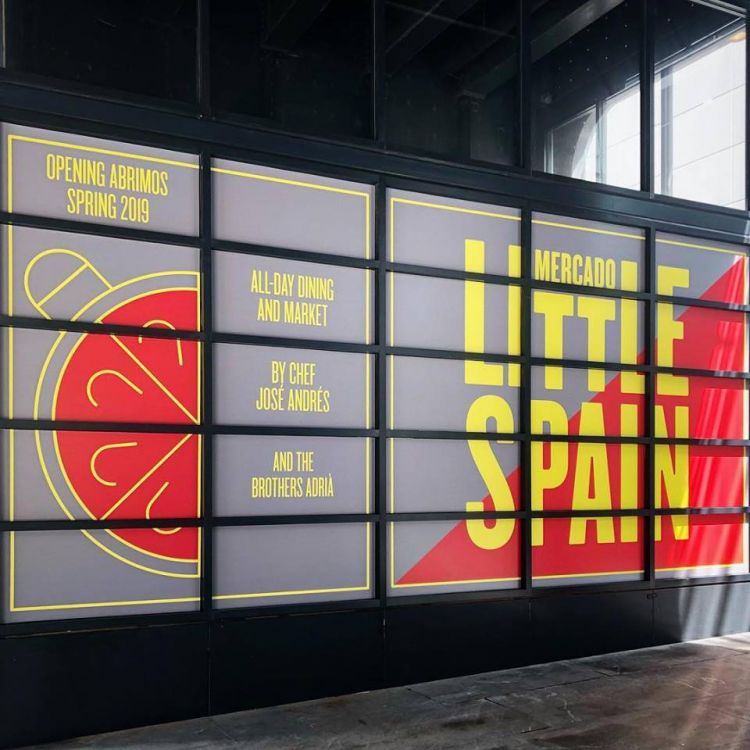
Mercado Little Spain in New York, work in progress
«
We’re arriving in New York»
What with Brexit and all, says
Ferran, one would rather avoid the British capital. «My brother
Albert has just opened
Cakes and Bubbles there, inside
Cafè Royal (70 Regent Street,
www.cakesandbubbles.co.uk), a place dedicated to pairing fine pastry with bubbles». And the next stop is New York. «In May,
Mercado Little Spain will debut in Hudson Yards, an innovative, incredible neighbourhood. The chef will be
José Andrés. I will help at first. It will be a sort of
Eataly, but without shelves». The focus will be on Spanish culinary culture, «I’m proud to export it. I think of gazpacho, which for me is the most brilliant popular recipe: healthy, modern, vegetal. It will be a success on the other side of the ocean too. This is the current gastronomic trend worldwide: tapas, sushi».
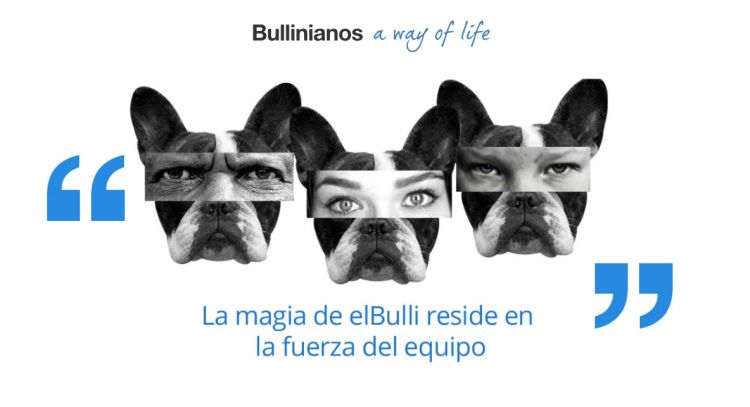
The online list of bullinianos
«
The central-role of elBulli»
ElBulli closed in 2011, but it’s never been so important from a gastronomic point of view,
Adrià says while he speaks of the new three stars given to
Mauro Uliassi in Italy: «He’s also worked with us, like so many others. In 2001 we had
Massimo Bottura,
René Redzepi and
Grant Achatz, all at the same time. In general, some 2100
cocineroscame at Cala Montjoi. This was possible because we were closed 6 months each year. So the turnover was mandatory. Was it hard to manage? Not so much: at first, then we found a method. Today I’m happy of the work of
bullinianos like
Mateu Casañas, Oriol Castro and Eduard Xatruch at
Disfrutar in Barcelona and, again in Barcelona, of
Albert Raurich (previously at work with
Dos Palillos’s oriental cuisine) at the new
Dos Pebrots», offering Mediterranean tapas that investigate cultural-gastronomic influences in the history of Catalonia, starting from the Greeks and the Romans.
«
ElBulli 1846 will be even more important than elBulli»
But the attention of
Adrià is focused on
elBulli 1846 [the number of dishes he created in his restaurant, as well the year
Georges Auguste Escoffier was born], the revolutionary project in the location of the
elBulli, 6000 square metres dedicated to creativity. «I will only make one presentation, at
Madrid Fusión in January». All right, but what is it going to be like? «Something much more important than
elBulli itself». Let’s try to explain it to our readers... «It’s not easy. It won’t be a university, nor a business. I’d say it will be a sort of private centre run by the
elBullifoundation [the safe storing
Adrià’s ideas, funded by
Lavazza with
Telefonica, CaixaBankand
Grifols, the latter represented in Milan by general manager
Lluís Garcia] and will become a global centre where innovation experts will be able to research, study, and experiment on creativity and efficiency». They will analyse the methods of innovation rather than innovation itself, so as to determine models that can be exported to other fields. «This though in fact there’s no such thing as one model. We don’t know a thing about the creative process». Excuse me? «I told you, it’s hard to explain. Put it this way, it seems a
locura. You’ll see».
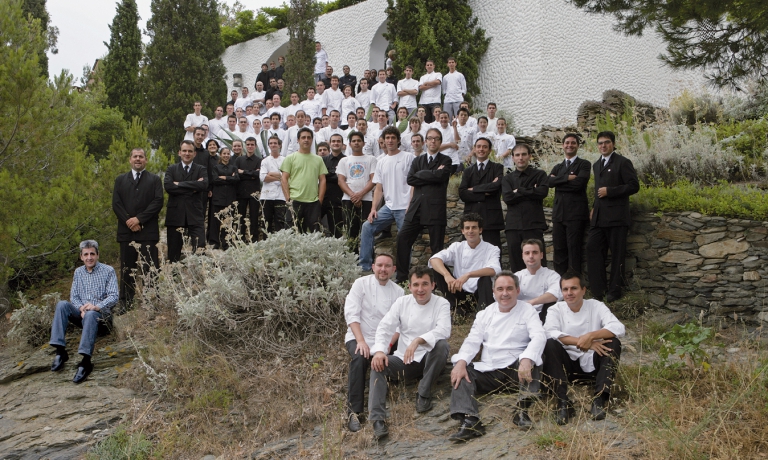
A brigade at elBulli, in 2007
«
The casting is open. I want few people, but valuable»
To select the staff for
elBulli 1846 Ferran wants to organise three events for «cooks, philosophers, journalists, scientists... And we’ll need some "agitators", people who will question what is known, creating stimuli for creative freedom». The first event in January, «we’re taking a maximum of 15-20 people as a first step. No more: more than that, and the leader of a group dedicated to innovation will lose control of the team. Ideally, we shouldn’t have no more than 12 people... How will I select? We have an eye for these things now. At
elBulli it was easy:
Aduriz sent me the best,
Bottura sent me the best, and so on. What are we going to do? Everything. Every possible thing. As long as it’s legal. We won’t communicate much: it will be a long seller, it wouldn’t be enough just to write a quick report and that’s it. The topic: basic investigation on innovation, so that we can set the conceptual foundations».
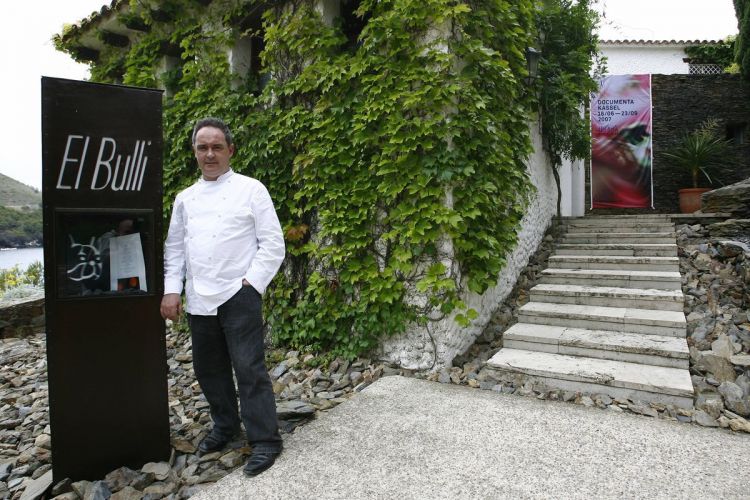
An old photo of Adrià in front of elBulli
«
Cuisine? It’s a disaster»
The perception one has of cuisine from the outside,
Adrià says, is a disaster: «People don’t even know what
nouvelle cuisineis. It’s something 40 years old. People think I’m
el demonio de la espuma, when now everyone is using syphons, even
cocineros mas tradicional. If we want this sector to grow, we must devote ourselves to knowledge. I believe we need at least 50 years but today we have a big help from the internet, the digital world, so perhaps 20 will be enough. I’m a strong critic, it’s true: but I also believe that the young chefs of today are much more prepared than those in my generation. I believe the only way to make a leap in terms of quality is to learn other subjects too. And study in detail: how can it be that the first book on the history of gastronomy was written less than 80 years ago, in German? How can it be that you Italians almost ignore
Bartolomeo Scappi, who could be compared to
Marie Antoine Carême? There’s plenty of work to be done».
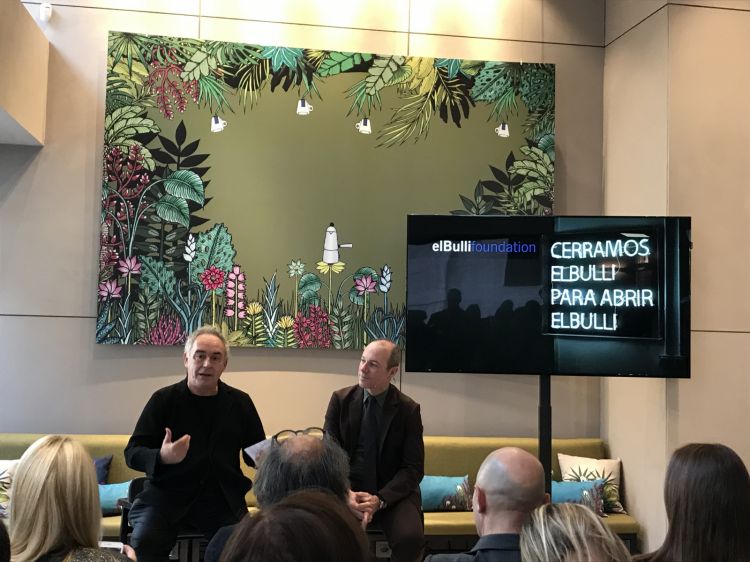
Adrià with Giuseppe Lavazza during the press conference for the presentation of Coffee Sapiens, a book published with the contribution of Lavazza to the great Bullipedia project
Please note that
Adrià is hardly pessimistic. In fact, he oozes energy and optimism, and the desire to grow: «People say:
the past is so beautiful! I reply: there was the plague in the past.
Oh, politics are horrible! Why, do you think it was better, in ancient Greece? This is an extraordinary age in which the Internet has changed and is changing everything».
The evening draws to an end. Ferran is speaking of another project, a sort of "Cooks’ Tripadvisor", with a global audience of selected professionals - chefs, sommeliers, journalists, food writers – who will be able to give their assessment, «it won’t be a best-of list. I’m thinking of the 200 who even today, without the support of an organisation behind them, are naturally influential. Not a clan, but a group of free thinkers capable of sharing their truth. Brilliant minds: Philippe Regol, Giles Coren, Paolo Marchi». He discusses global trends: «The only two great gastronomic cultures that still need to be developed are the Indian and Arab ones. Unfortunately, they’re stuck in 1100». Finally, he leaves with a tasty memory: «The best pizza I’ve ever had? At Enzo Coccia’s in Naples, at pizzeria La Notizia. But I had a marvellous one, this small (and using his hands he mimes a small dessert plate) in Barcelona». Unfortunately, he can’t remember the name of the pizzaiolo, «he’s Italian, he’s been working there fore 15 years». Clues are welcome.
Translated into English by Slawka G. Scarso